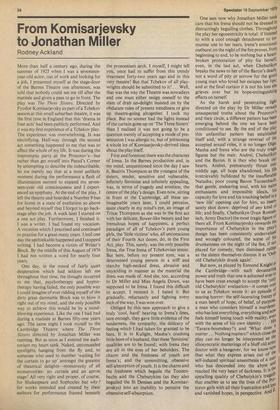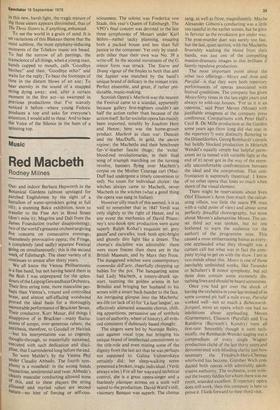From Komisarjevsky to Jonathan Miller
Rodney Ackland
More than half a century ago, during the summer of 1925 when I was a seventeenyear-old actor, out of work and looking for a job, I presented myself at the stage-door of the Barnes Theatre one afternoon, was told that nobody could see me till after the matinee and given a pass to go in front. The play was The Three Sisters. Directed by Fyodor Komisarjevsky as part of a Tchekov season at this small suburban theatre, it was the first time in England that this 'drama in four acts' had been publicly performed. And it was my first experience of a Tchekov play. The experience was overwhelming. It was electrifying. Half-way through the second act something happened to me that was to affect the whole of my life. It was during the impromptu party at the Prozorov's—but rather than get myself into Pseud's Corner by attempting to describe the indescribable, let me merely say that at a most unlikely moment during the performance a flash of illumination seemed to expand my seventeen-year old consciousness and I experienced an epiphany. At the end of the play, I left the theatre and boarded a Number 9 bus for home in a state of exaltation so above and beyond myself that I forgot to go backstage after the job. A week later I started on a one act play. Furthermore, I finished it. I was a writer. I had found my vocation. A vocation which I practised and continued to practise for a great many years. Until one day the unthinkable happened and I stopped writing. I had become a victim of Writer's Block. By the middle of this August of 1976
had not written a word for nearly four years.
One day, in the mood of fairly quiet desperation which had seldom left me throughout that time, the thought occurred to me that, psychotherapy and hypnotherapy having failed, the only possible way I could imagine of ever ridding myself of the dirty great damnable Block was to blow it right out of my mind ; and the only possible way to achieve this would be by a mindblowing experience. Like the one I had had during a matinee at Barnes fifty-one years ago. The same night 1 took myself to the Cambridge Theatre where The Three Sisters directed by Jonathan Miller was running. But as soon as I entered the auditorium my heart sank. Naked, unconcealed spotlights hanging from the fly and, to someone who used to number 'waiting for the curtain to go up' amongst the greatest of theatrical delights--monstrosity of all monstrosities: no curtain and an apron stage! All very right and proper, of course, for Shakespeare and Sophocles but why? for works intended and created by their authors for performance framed beneath
the proscenium arch. I myself, I might tell you, once had to suffer from this trendy treatment forty-two years ago and in this very theatre! But that Tchekov of all playwrights should be submitted to it ! • . Well, that was the way the Theatre was nowadays and one must either resign oneself to the state of drab un-delight insisted on by the obdurate rules of present trendiness or give up theatre-going altogether. I took my place. But no sooner had the lights instead of the curtain gone up on 'The Three Sisters' than I realised it was not going to be a question merely of accepting a mode of presentation I was allergic to, but of jettisoning a whole lot of Komisarjevsky-derived ideas about the play itself.
First and foremost there was the character of Irena. In the Barnes production and, in my mind, unquestioned since the day I saw it, Beatrix Thompson as the youngest of the sisters, tender, sensitive and vulnerable, infinitely feminine and infinitely appealing, was, in terms of tragedy and emotion, the centre of the play's design. Even now, sitting in front at the Cambridge, all these unimaginable years later, I could perceive, quite clearly in my mind's eye, an image of Trixie Thompson as she was in the first act with her delicate, flower-like beauty and her tremulous hopes of happiness, a perfect paradigm of all of Tchekov's pure young girls, the 'little victims' who, all unconscious of their Fourth Act doom, do, in the First Act, play. This, surely, was the only possible Irena, the True Irena of Tchekovian intent. But here, before my present eyes, was a determined young person in a stiff and starchy high-necked dress, abrasive and unyielding in manner as the material the dress was made of. And she, too, according to Dr Miller and Miss Angela Down, was supposed to be !rem. I found this difficult to accept. I resisted it. I hated it. But gradually, reluctantly and fighting every inch of the way, I was won over.
Obliged by this new approach to give a truly 'cool, hard' hearing to Irena's lines, sure enough, they gave little evidence of the tenderness, the sympathy, the delicacy of feeling which I had taken for granted to be hers. It is in Kuligin, Masha's crashing little bore of a husband, that these 'feminine' qualities are to be found ; with Irena they are all in the eyes of her beholders. The charm and the freshness of youth are Irena's; and the unremitting, obsessive self-absorption of youth. It is the charm and the freshness which beguile the Toozenbachs and the Chebutykins (as they also beguiled the St Denises and the Komisarjevskys) into an inability to perceive the obsessive self-absorption.
One sees now why Jonathan Miller took care that his Irena should not be dressed in distractingly beguiling clothes. Throughout the play her egocentricity is total : if listened to with a cool enough detachment to immunise one to her tears, 1 rena's emotional outburst on the night of the fire proves, froni beginning to end, to be nothing but a heartbroken protestation of pity for herself; even, in the last act, when ChebutikYn breaks the news to her of the Baron's death, not a word of pity or sorrow for the good young man who loved her escapes her lips; and at the final curtain it is not his loss she grieves over but its hope-extinguishing effects on herself.
As the harsh and penetrating light directed on the play by Dr Miller reveals unsuspected truths about the Prozorov's and their circle, a different pattern has beet emerging behind the one we have beet conditioned to see. By the end of the Play, this unfamiliar pattern has established itself and, with a strange reversal of the accepted sexual roles, it is no longer Olga, Masha and Irena who are the truly tragic figures but the men: Andrei, ChebutikYn and the Baron. It is they who break our hearts. Andrei, prematurely thrust int° middle age, all hope abandoned, his life irretrievably bulldozed by the insufferable Natasha; poor young Baron Toozenbach. that gentle, endearing soul, with his naive enthusiams and impossible ideals, his capacity for love and his touching belief in a 'new life' opening out for him, so inseilsately shot down: deprived of any kind of life; and finally, Chebutikyn (Ivan Roman; isch, Army Doctor) the most tragic figure 01 them all. From Komisarjevsky onwards the importance of Chebutykin in the plaY 5, design has been consistently undervalue° and wrongly coloured, the scene of his drunkenness on the night of the fire, if not played for comedy, then dismissed rather as the sisters themselves dismiss it as 'OnlY old Chebutykin drunk again'. But now, as played by Esmond Knight at the Cambridge—with such devastating power and truth that one is ashamed ever t° have been crass enough to accept the 'onlY old Chebutykin' evaluation—it comes over, to us as Tchekov wrote it : an episode O. searing horror: the self-lacerating frenzY a man bereft of hope, of belief, of purpoSe, a man who considers himself a murderer' who has lost everything, everything and riogi feels himself losing touch with reality, ene.r1, with the sense of his own identity . . `Tarara-boomdeay!'s and 'What does matter ... Nothing matters!' which close the play can no longer be interpreted as the, idiosyncratic mutterings of a bluff old doctor with a hangover, for we know n°,e that what they express arises out of self-induced spiritual anaesthesia of a Mad who has descended into the abyss at reached the very heart of darkness. It is dr appalling quality of Chebutykin's trage that enables us to see the lives of the Pr° zorov girls with all their frustration and loss f, and vanished hopes, in perspective. Arlv i in this new, harsh light, the tragic stature of the three sisters appears diminished, that of The Three Sisters is, if anything, enhanced.
To see the world in a grain of sand. It is on variations of this Blakean theme that the most sublime, the most epiphany-inducing moments of the Tchekov music are based. To feel the sorrow of all partings, the transcience of all things, when a young man, hands cupped to mouth, calls 'Goodbye birches!' and then, 'Goodbye echo!' and waits for the reply; To hear the footsteps of time in the distant blows of an axe; To hear eternity in the sound of a snapped string dying away; and, after a certain moment in the first act—so swamped in Previous productions that I've scarcely noticed it before—where young Fedotic Produces a top and asks for everyone's attention, I would add to these: And to hear the Voice of the Silence in the hum of a spinning top.






































 Previous page
Previous page